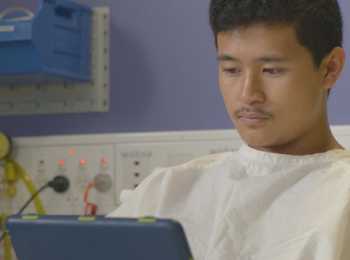Contents
Part 4
Hospital or home? Where will they be at the end?
Memories and stories
“Try not to distance yourself from the situation too much,
you will regret not spending as much time as possible with your ill family member, take the time to get to know them and ask any questions you want.”
Lizzie
Look back over their life…
Often when a person is dying, they like to reflect on their past and think of their achievements so that they can see that their life has been important.
If your mum or dad feels up to it, you could sit down and talk about their favourite memories and look back over their life. Even if they don’t, you might be able to get answers and stories from other people in your family or community.
Don’t worry that you’ll say the wrong thing or that you’ll both get emotional. Ask them about anything and everything you want to know. No question is too simple.
“I’d like to know his opinion on teenage things –
like what does he think of me having a boyfriend at 15?”
Erin
…and look forward over yours
A lot of young people say that trying to imagine life without your mum or dad is by far the hardest part of this experience. It will be heartbreaking to think of all the things they will miss out on and you wish they could be there for – your graduation, your wedding, having kids.
At moments like this in the future, you may wonder what your parent would think about this and what they would say about that. You will not be able to predict all of the conversations you might ever want to have with them, but many young people like to spend this time now hearing their thoughts and dreams for you and the future.
“I wish I talked to him more about life, what I dreamt of doing and what I hoped to achieve. Just talking about anything apart from cancer would’ve been so beneficial.”
Melissa
"If there’s something you want to know, don’t waste time thinking about it, just ask them."
Peta

Ideas to get the ball rolling…
- Where were you born?
- Tell me a story from when you were little.
- What did you want to be when you grew up? What were you like as a teenager?
- What was your first job?
- Where did you meet my Mum/Dad?
- Who was your first boyfriend/girlfriend?
- Tell me about when I was a baby.
- What is your favourite memory?
- What did you think I’d be when I grew up?
- What do you hope for the future?
- What is your favourite colour?
- What is your favourite movie?
- What is your favourite place?
- What is your favourite song?
- What is your favourite food?
- What is your favourite quote?
- What is your most important achievement?
- What did you think I’d be when I grew up?
- What do you hope for the future?
- What is your favourite colour?
- What is your favourite movie?
- What is your favourite place?
- What is your favourite song?
- What is your favourite food?
- What is your favourite quote?
- What is your most important achievement?
"I would have liked to ask how did you meet Mum, how did you know you loved her? No matter how much you say or how many memory boxes you make, you’ll always want to know more."
Andrew

Collecting memories
When your parent dies, the memories you have of them will probably become really precious. Even the smallest knick knacks and silliest stories can take on huge sentimental value and become special keepsakes that you will treasure forever.
If you have the opportunity now, you might be able to start collecting things that will help to remind you of them in the future. This might be something you can do together.
Here are some ideas:
- Create a photo album or slide show. You could write a paragraph next to each one about what your parent remembers about that photo.
- Make a CD of songs that your parent likes or that remind you of them.
- Make a scrapbook.
"My sister and I both made scrapbooks of sayings (from Dads favourite movies) and little items (lolly wrappers or movie tickets) from throughout the time Dad had been sick. I spent as much time with Dad talking to him or just being with him, even when he was asleep."
Sarah
- Make a memory box.You could put things in there that are special to your parent or remind you of them - like photos, tickets, cards, clothes, toys or jewellery.
- Write a journal. You could write down all the things you are feeling now. It might help you to maintain a connection in the future.
- Take photos. You can never have enough. You may not want to take photos of your parent if they are looking really sick. You could take photos of what the house looks like now, how your parent decorates the house at Christmas, what their room was like. There might be big changes in your home and one day you might really want to remember.
- Create a video or voice recording. You could ask them to tell stories about their life, or retell memories you have together.
- Make a physical record. Draw around their hand, make a handprint in plaster, record how tall they are, cut off a lock of hair. Write it all down, you’ll want it in a few months and years.
"Memorise what they look like, their expressions, smiles, eye colour. Little things that seem to fade a little after a while."
Sarah
- Write a song or poem about your parent, or how you are feeling.
- Create a family tree. Record what they know about your family history.
- Collect their smell. The sense of smell can be really powerful in bringing back memories. Ask your parent what perfume, aftershave or soap they use.
Everyone approaches the end of life differently. Don’t worry if your parent doesn’t feel like preparing things like this with you before they die. It doesn’t mean they don’t care. You can still prepare memories on your own later, if you like. If you don’t want to that’s OK too. There will be lots of ways to remember your mum or dad.

Intro to palliative care
“I thought ‘palliative’ was a cancer ward. I thought the nurses just wanted to keep an eye on her. It didn’t
cross my mind to ask what it meant.”Lisa
When it no longer seems likely that your parent will get better, the focus of their treatment shifts from trying to get rid of the disease, to managing symptoms and pain and helping them to feel as comfortable as possible. This type of care is called “palliative care”.
The main aim of palliative care is to improve the quality of life for your parent by looking after all of their physical and emotional needs. It is a focus on giving your parent the best life possible while they deal with advanced cancer.
“Palliative” does not mean “dying”. It is not just for people who are about to die, although end-of-life care is part of palliative care.
Palliative care does not aim to make your parent’s life shorter or longer. It aims to make what life they have left as dignified and peaceful as possible.
Top tips
Palliative care aims to make your parent comfortable so they can focus on living.
What kind of support does palliative care provide?
A palliative care team recognises that your parent has many different physical, emotional, practical and spiritual needs and that the best kind of approach is one that works together to look after all of these needs. It also offers support to you and your family to help you care for them and cope with the situation.
Each palliative care team provides its own set of services to a patient and their family. They tailor it to your unique needs as a family. This may include:
- Nursing and medical care – in a hospital or hospice or at home
- Counselling and social worker services
- Dietary advice
- Loan of equipment
- Physiotherapy and occupational therapy
- Therapists skilled in music, massage, aromatherapy, or colour
- Spiritual support and pastoral care from a range of cultural and religious backgrounds
- Volunteers to help you care for your parent
How can we access palliative care?
Depending on your needs, your parent may receive palliative care from their own GP or health care team, or they may be referred to a specialist palliative care team. There are services available in most areas of Australia.
How do we know if it’s time to consider palliative services?
Accessing palliative services as early as possible can make things easier for your parent and your family. A lot of people avoid palliative care as long as they can because they are afraid that it means they have given up hope and are going to die soon.
Your parent’s health care team will probably recommend if it is time to consider palliative care. Your parent can even refer themselves by contacting a local service.
You can start palliative care from the first time you are diagnosed with a terminal illness. It’s not a one-way door. If your parent’s illness stabilises or improves, palliative services can be stopped.

If my parent is referred to palliative care does that mean they are about to die?
Palliative care is for people whose illness has not responded to treatment and it’s likely it cannot be cured. The focus of palliative care is comfort and quality of life. But no one can tell you exactly when they will die. Palliative care will help your parent to live in comfort for the rest of their life. This could be weeks, months or years.
Is palliative care like euthanasia?
No. Euthanasia is assisting the death of someone who would prefer to die. This is illegal in Australia. Palliative care is about helping to give your parent the most comfortable and pain-free life.
Will we have to pay?
Palliative care is usually free. It is often funded by the government or charitable organisations. However, some hospitals and hospices might charge fees for in-patient services (these can often be covered by Medicare or private health insurance).
If my parent is in pain, can it be eased?
In almost all cases, pain can be overcome or made bearable. There is a wide variety of drugs used to treat pain and various ways that it can be given such as orally, into the vein or patches on the skin.
A family of drugs commonly used to treat pain are called “opioids”. Morphine is one of the best known and commonly used. Morphine can be used for long periods of time and although the dose may need to be adjusted as your parent’s body develops a tolerance to it, this does not mean that their condition is getting worse or that they are getting addicted.
There are also other ways to relieve pain, such as massage, meditation, using hot and cold packs, aromatherapy, acupuncture or hypnotherapy.
Who can I ask if I have questions?
Your parent’s palliative care team are there to help you too. There is no question too small or silly to ask.
Remember: Your parent has a right to make decisions about their treatment and care right up until the end of their life.

Things to discuss - End of life decision making
We all know that sooner or later we are all going to die. But who wants to think about that before you really have to?
Your family might avoid talking about your parent’s death, thinking that if you accept it is going to happen somehow you will make it happen sooner. But sometimes when we avoid having a conversation about death with the person who is dying while they still can, we miss out on the opportunity to hear their wishes for what will happen at the end of their life.
Your parent has a right to make decisions about their treatment and care right up until the end of their life. They may be less able to think clearly as death approaches, so it’s a good idea to start talking about these things sooner rather than later. It’s important to write these wishes down and to tell the medical team about them, to make sure they get followed when the time comes.
These include things like:
- Making an “advance care directive” to tell doctors what kind of treatments are or are not wanted, no matter how ill they become. This includes things like whether they want to go on life support.
- Deciding who will be their “Medical Power of Attorney”. This is a person who will make decisions for your parent if they can’t speak for themselves.
- Where would they like to die if they have a choice?
- Would they like to donate organs if they can?
- Would they like their body to be buried or cremated?
- Do they have any ideas for their funeral?
- Do they have a Will? This is a legal document that states what a person wants to happen to their money and property after they die.
- Who will look after you (if you are under 18) and your brothers and sisters after they die?
Hospital or home? Where will they be at the end?
Depending on your parent’s illness and other factors, your family might decide that your parent will be cared for at home, in a hospital, or in a special palliative care unit or facility, sometimes called a hospice. Your parent might move between these places as their need for care and support changes.
There will be lots of things to consider when your family decides where your parent will be, such as their care needs, the area you live in, the support available and what your family feels comfortable with. There is no right or wrong place for them to be. And you can change your mind at any time.
It’s important that you are open and honest about how you feel about the decisions for your parent’s place of care. Ask for more information if you are unsure about the options.

Caring at home
Many people would prefer to be at home in the final stages of their illness. If your family decides that your parent will be cared for at home, the palliative care team can provide all sorts of support to make them comfortable and help your family to cope.
It can be really rewarding having your parent at home in their final stages. They may be happy to be in their own bed, surrounded by family and friends. You may appreciate having the time to spend with them and come together as a family.
But looking after someone at home can be physically and emotionally tough. Your family may not have much experience caring for someone who is dying and it’s important you don’t take on more than you can handle. While it’s OK for you to help out, you should not be in charge of their care. If you have any concerns about your dying parent being cared for at home, speak to your family or the palliative care team. The palliative care team will be able to support you.
"Dad was at home, we had to make sure the house was kept clean, we had to make sure the animals stayed outside. Sometimes if Dad was having a bad day, we had to keep a bit quieter and stay away from his tummy. My little sister and I took turns to stay home with Dad while everyone else went out."
Amy
You may want to talk with your family about what you do and don’t feel comfortable doing for your parent. There are lots of ways to support them if you don’t want to help with their physical care. Bringing them some fresh flowers or reading the paper to them can make a big difference to their quality of life.
The hardest part was the change from child to carer. My Dad could no longer care for me so I had to be more independent and help him… Dad wanted to be home for his passing. I wanted him to be in hospital, as his presence overwhelmed me.Lizzie
“Dad came home from hospital; we set up a hospital bed in the lounge room. It was good at that time.”
Amrita
There may be changes in your parent’s mood, behaviour and appearance when they are approaching the end of life. You might find it really distressing to see them become weaker and have less energy.
"Living at home throughout the whole ordeal was extremely traumatic. I can recall sitting down to study for my year 12 exams, only to hear my parent in another room wailing and crying. The difficult part wasn’t necessarily being able to focus on my study, but was in fact because I was so helpless to do anything."
Chris
It’s really important that you plan time to get out of the house and take a break from the situation sometimes. Also try to get as much sleep as you can and to eat regular and nutritious meals. You need to take care of yourself too, so you have more energy to enjoy the time you have with your parent.
Remember that there is also a lot of support available to help your family care for your parent. Your GP should be available to call on if you need. There may also be district nurses who can come and help with nursing care such as giving drugs, changing dressings and helping with washing and toilet needs.

Hospital or hospice
Hospital or hospice Your family may also feel more comfortable if your parent is cared for in a hospital or hospice where trained staff can look after them and relieve pain and other symptoms as necessary. A hospice or palliative care unit in a hospital is a place that provides all sorts of care for people with an illness that is unlikely to be cured.
If your parent goes into hospital or a hospice, you might feel worried that they might not be able to come home again. But it’s usual for someone to go into a hospital or hospice for a short time to have their symptoms monitored and brought under control and then, if they wish, go home again. Your parent might be able to go into a hospice for a little while to give your family a rest from looking after them.
Many hospices are often smaller and quieter than hospitals, or might be a dedicated area within in hospital.
You may be able to stay over with your parent in a hospital or hospice – but make sure you get away sometimes, if that’s what you need to do.
“I felt that the hospice was the best place.
It wasn’t too impersonal but there were medical professionals nearby.”Megan
The final stages
Dying and death are very frightening words that we all struggle with. You might be having horrible, unbearable thoughts and feel quite scared and confused about what is going to happen when your parent dies.
The pain and stress that knowing that someone you love is going to die cannot be taken away. But if you know a little bit about what to expect when it actually happens you might be a bit less freaked when it does.
You may be really worried that death will be painful for your parent. But the time before death is usually peaceful. The body slowly winds down as it starts to ‘let go’ of life.
There are some signs that death is near, although it is impossible to know the exact moment that death will occur. Sometimes these changes start weeks before death, sometimes days, sometimes hours. Each person’s experience is unique.
"It was surreal.
The doctors had a pretty precise estimation about how long my Mum had left, but even so, it was unimaginable."
Megan
Signs of approaching death
- Weak and lacking energy. Your parent may spend a lot of time sleeping and be hard to wake up. It’s best to let them sleep and talk to them when they seem most alert.
- Less appetite and thirst. As your Mum or Dad gets weaker, they may have trouble swallowing or digesting food. Small sips of water or ice to suck might help.
- Temperature changes. Sometimes they may feel cool, other times hot and clammy. This is because their blood circulation is slowing down.
- Incontinence. This is when they lose control over their bladder and bowel. The palliative nurses will advise you how to help.
- Breathing changes. Their breathing may be noisy as fluid collects in their breathing passages. This can sound like gurgling or rattling sounds. They may also breathe really fast one minute and really slowly the next and they may stop breathing for a few seconds. These breathing changes are usually not distressing for the patient, although you may find it frightening. It can help to raise the head of the bed with pillows.
- Hearing. Even if your Mum or Dad doesn’t respond when you are talking, they can probably hear you. They may find it really comforting to know you are there.
- Changes in mood and behaviour. As your parent nears the end of life, they may experience a lot of different emotions that may change very quickly. They might seem to become withdrawn, talking less and losing interest in things around them. Sometimes it might seem like they don’t recognise you. This can be really upsetting, but it’s a natural process of gradually withdrawing from the world. Sometimes they might be angry or irritable. You may not have done anything wrong and just being there and listening can be supportive.
Check with the medical and nursing staff if you are unsure or worried about any changes you notice in your parent.
Whether your parent is at home or in hospital or a hospice at this time, there will be huge changes to your life. It may feel like real life is suspended and you are living in a completely different world.
"During the end stages my dad had lost nerve function of one side of his face, so he needed a straw to drink and couldn’t talk properly...It made me sad to see my Dad so frail and bald. The once chubby and jolly man was wasting away, and I couldn’t see him anymore."
Lizzie
Try to talk with your family about whether you want to be woken up or taken out of school when death is approaching. If you do want to be there, make an agreement with your family that they will let you know what is happening as soon as they know. It’s OK if you don’t want to be there, there will be plenty of ways you can still say goodbye.


















